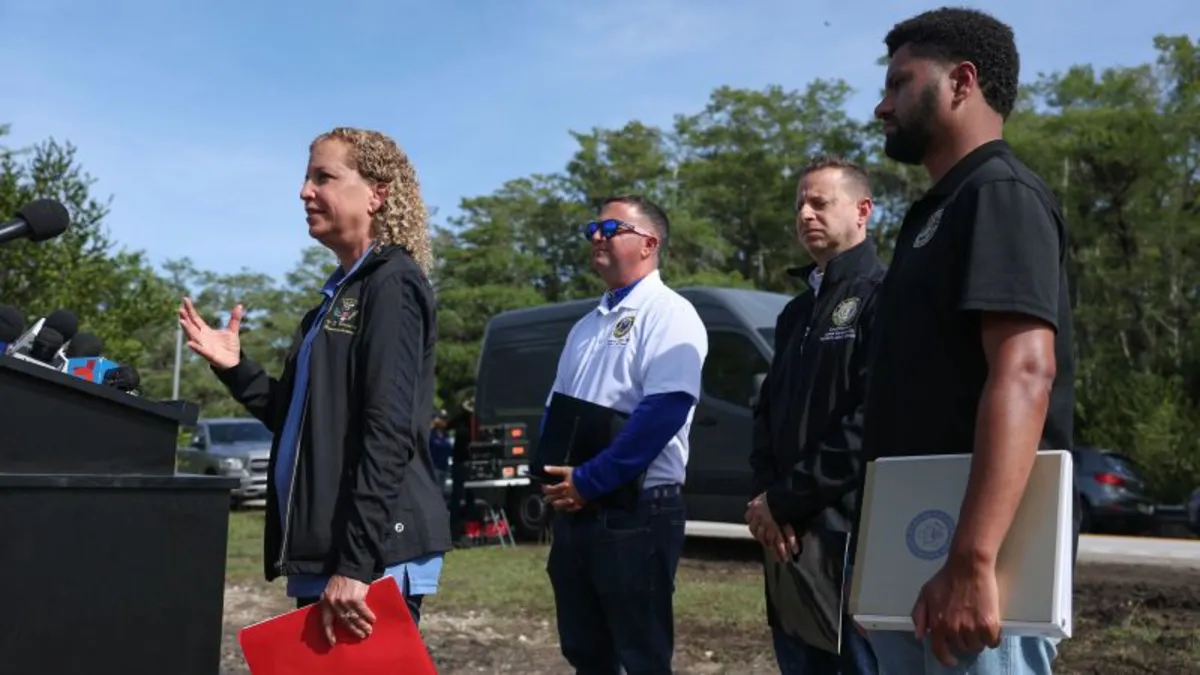
Deep within the hazardous and ecologically fragile Everglades, hundreds of migrants find themselves confined in cages within a makeshift tent detention facility. Florida’s Republican governor, Ron DeSantis, describes this site as “safe and secure,” while Democratic lawmakers have labeled the conditions as “inhumane.” The facility, infamously dubbed “Alligator Alcatraz,” has drawn significant scrutiny and controversy regarding its treatment of detainees.
Recently, members of Congress and state representatives filed a lawsuit against Governor Ron DeSantis, asserting they were “unlawfully denied entry” to inspect the facility. After two days of legal battles, they were granted a limited tour on Saturday. Lawmakers expressed their concerns, stating that the lack of access seemed like a “deliberate obstruction meant to hide what’s really happening behind those gates.” During the tour, they reported hearing detainees shouting for help and crying out “libertad,” which means “freedom” in Spanish, amidst sweltering heat, bug infestations, and inadequate meals.
Rep. Debbie Wasserman Schultz, who represents Florida’s 25th Congressional District, described the dire conditions during a news conference following the tour. “They are essentially packed into cages, wall-to-wall humans, 32 detainees per cage,” she explained. Families of some detainees have echoed these concerns, claiming the treatment is inhumane. Meanwhile, Immigration and Customs Enforcement (ICE) officials argue that the facility maintains higher detention standards than many U.S. prisons.
During the tour, lawmakers were not permitted to visit areas where migrants are currently detained. Instead, they were shown empty cells yet to be occupied. Wasserman Schultz noted that each cage contained three small toilets with attached sinks, which detainees must use for both drinking water and personal hygiene, sharing the same water used to flush toilets. In stark contrast, while government employees were served large portions of roast chicken and sausages, detainees were provided a meager lunch of “a gray turkey and cheese sandwich, an apple, and chips.” Wasserman Schultz remarked, “I don’t see how that could possibly sustain them nutritionally or not make them hungry.”
Rep. Maxwell Alejandro Frost, who also participated in the tour, voiced concerns over reports of unhygienic conditions, including non-functional toilets and “feces being spread everywhere.” Lawmakers were denied access to view the medical facilities, with officials citing HIPAA laws. Frost stated, “It is something everyone, whether you’re Democrat, Republican, or anything, should be deeply ashamed of.” He emphasized the vital role of immigrants in American society, declaring, “They are the blood of this nation.”
U.S. Rep. Darren Soto highlighted serious concerns regarding flooding, especially considering the potential dangers posed by severe weather during what could be a busy hurricane season. After the tour, Soto called the entire operation a “political stunt” that wastes taxpayer dollars while endangering detainees and ICE agents alike.
As of now, approximately 900 people are detained at the facility, which has a capacity of up to 3,000 individuals. The wife of a 43-year-old Guatemalan man currently at “Alligator Alcatraz” shared her husband’s difficult experience. After more than two weeks in detention, he still has not seen a lawyer. She described the unsanitary conditions, including an abundance of mosquitoes, frequent power outages, and insufficient food. “Sick people are not getting medication,” she lamented.
Remarkably, “Alligator Alcatraz” was set up in just eight days, transforming the Dade-Collier Training and Transition Airport from an 11,000-foot runway into a temporary tent city. Former President Donald Trump praised the facility’s rapid construction during his visit, viewing it as a model for future implementations across other states. This project was expedited under an executive order from Governor DeSantis, who has framed illegal immigration as a state emergency.
The situation at “Alligator Alcatraz” continues to raise ethical questions about the treatment of migrants and the broader implications of U.S. immigration policy. As conditions remain contentious, the eyes of lawmakers and advocates are keenly focused on ensuring humane treatment for all detainees.